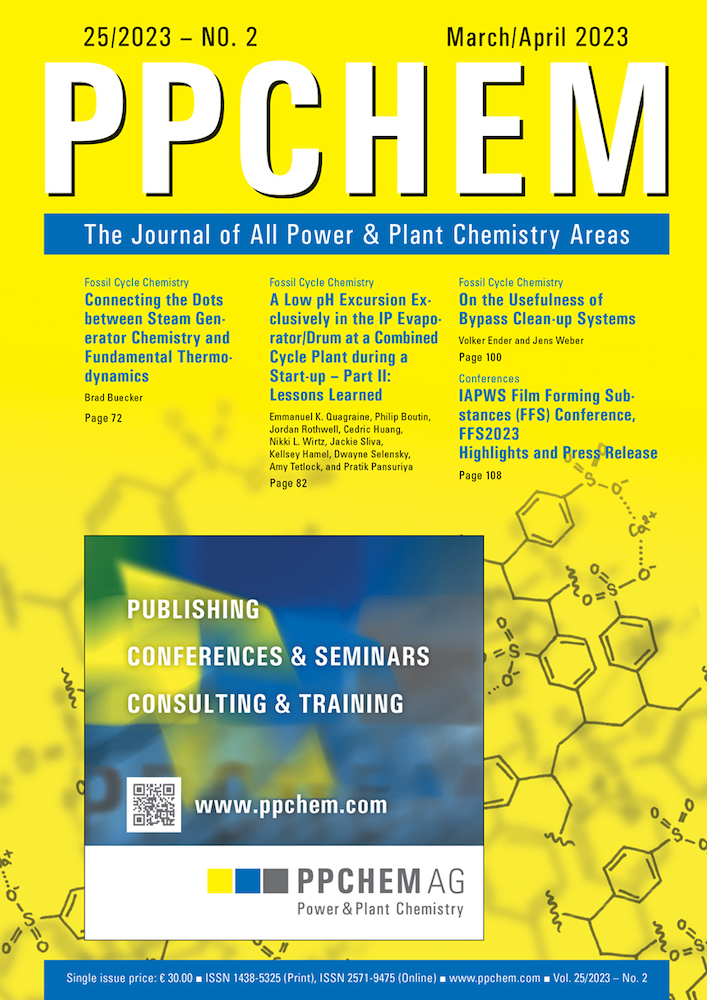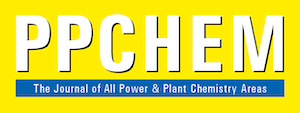
For members only
ABSTRACTS
Connecting the Dots between Steam Generator Chemistry and Fundamental Thermodynamics
Brad Buecker
Experience has shown the importance of the necessity of comprehending the thermodynamics of steam generator heat transfer to better understand the chemistry requirements. Besides the corrosion aspects of water- and steam-side impurity ingress, efficiency losses can be expensive.
To minimize efficiency losses, condenser performance should be monitored diligently and it must be ensured that cooling water chemical treatment programs are operating properly and that air in-leakage has not become excessive. Reheating improves efficiency only by a few percent, but basic thermodynamic calculations show that steam reheating and introduction of the hot reheat to the intermediate-pressure turbine and crossover to the low-pressure (LP) turbine keeps the steam significantly drier in the LP turbine, with final moisture content usually below 10 % (and thereby minimizing water droplet erosion of the last stage blades).
In this article, we make the connection between major steam generator design details (and the thermodynamic principles behind them) and condensate/steam chemistry fundamentals.
PPCHEM® 2023, 25(2), 72–78
For Members only
A Low pH Excursion Exclusively in the IP Evaporator/Drum at a Combined Cycle Plant during a Start-up – Part II: Lessons Learned
Emmanuel K. Quagraine, Philip Boutin, Jordan Rothwell, Cedric Huang, Nikki L. Wirtz, Jackie Sliva, Kellsey Hamel, Dwayne Selensky, Amy Tetlock, and Pratik Pansuriya
This is the second of a two-part article on a low pH excursion which occurred exclusively in the intermediate-pressure (IP) evaporator/drum of a combined cycle plant, with the other circuits (low-pressure (LP) and high-pressure (HP)) showing normal pH. This is an odd situation, and the first half of the article explains how this was possible. Part II however describes how this unexpected situation confounded interpretations of the plant’s on-line instrumentation readings and the decision-making based on this data, which led to delays and inadequate response to the low pH excursion. A lot of confusion and uncertainties around pH readings were experienced and the causes have been identified. The plant also experienced a protracted period to clear the contaminant and attain desired steam purity for operation, the reasons for which are discussed. Lessons learnt and recommendations are also given to ensure early leak detection, prevention, or proper response to such pH excursions in the future.
PPCHEM® 2023, 25(2), 82–97
For Members only
On the Usefulness of Bypass Clean-up Systems
Volker Ender and Jens Weber
Instead of a simple water exchange, another possible method to correct the water quality in circulation systems is the method of bypass clean-up. To estimate the efficiency of a bypass clean-up, one must consider the inner efficiency as well as the outer efficiency. The inner efficiency is influenced exclusively by the method of cleaning being used, while the outer efficiency is ultimately decisive for an efficient application of bypass clean-up systems. The outer efficiency is determined by the relation between the different rate constants of the various processes which contribute to the decrease (or increase) in the concentration of the water constituents under consideration. Hence, one can find applications where a bypass clean-up can have high efficiencies, but there are also cases in which only low overall efficiencies may be achieved, despite high inner efficiencies. Using the framework presented here, it should be possible to estimate the effects on a theoretical basis.
PPCHEM® 2023, 25(2), 100–105
For Members only
IAPWS Film Forming Substances (FFS) Conference, FFS2023 Highlights and Press Release
The sixth IAPWS FFS International Conference was held on the 21st–23rd March 2023 in Prato, Italy chaired by Barry Dooley of Structural Integrity Associates, UK and David Addison of Thermal Chemistry, New Zealand. The FFS conferences are unique on a narrow topic in cycle chemistry control of power plants and steam generating facilities. In 2023 the conference attracted 70 participants from 28 countries which included 20 plant operators / users and representatives from 11 FFS chemical suppliers.
The FFS conferences are developed and supported by the International Association for the Properties of Water and Steam (IAPWS), and FFS2023 was arranged in Prato by Mecca Concepts, Australia and Combined Cycle Journal, USA. The sponsors of FFS2023 were Kurita Europe GmbH, Nalco Water an Ecolab Company and Termanox Water Treatment Solutions.
PPCHEM® 2023, 25(2), 108–109


